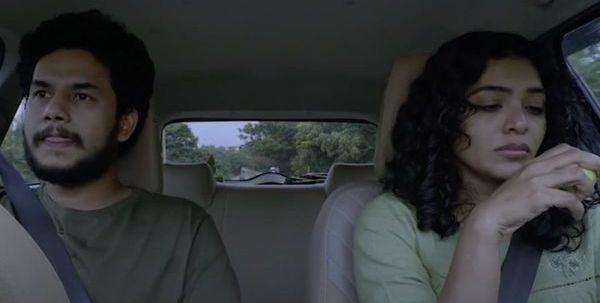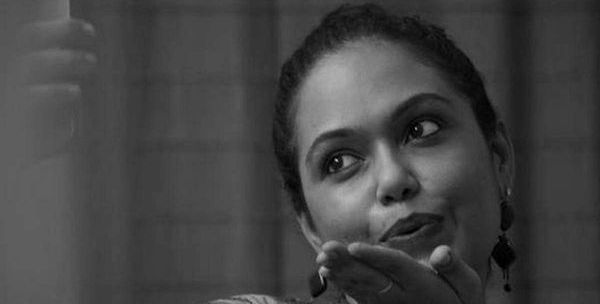Navigating Toxicity In Don Palathara’s Relationship Dramas

A writer from Mumbai, India

Contrasting Psyches
This year, the Indian auteur-in-the-making has come out with two distinctive films on man-woman dynamics that are likely to resonate with most modern-day couples. Both Everything Is Cinema (2021) and Santhoshathinte Onnam Rahasyam (Joyful Mystery, 2021) are set against the backdrop of the existing global pandemic which brings out the worst in the strenuous romantic relationships portrayed in the films. Although the two films deal with a common subject of discord in relationships, they significantly differ in their exploration of the contrasting psyches of the male protagonists.
In the former, Chris (Don Palathara‘s voiceover), a young filmmaker who aspires to recreate the modern version of Louis Malle‘s 1969 documentary, Calcutta, gets stuck indoors with his actress wife, Anita (Sherin Catherine), at the onset of COVID-19 in 2020. Told from the point of view of Chris, the reflexive Everything Is Cinema delicately captures the couple’s rising resentment and piercingly examines the male gaze and toxic masculinity. The disintegrating marriage eventually ends in separation, with an act of domestic violence at the hands of Chris serving as the final nail in the coffin.

In Santhoshathinte, much of the credit for the survival of the couple’s tumultuous relationship goes to the boyfriend, Jitin (Jitin Puthenchery). Unlike the passive-aggressive and confrontational nature of Chris, Jitin is a calm and empathetic partner who patiently puts up with the emotional outbursts of his girlfriend, Maria (Rima Kallingal), who is going through a pregnancy scare. Inventively shot in a single take using a fixed camera on the dashboard of a moving car, the film transports the viewers into the arguing couple’s strained dynamics. Maria holds Jitin responsible for the unprotected sex between them despite mutually consenting to the act, and is not ready to have a baby with him before marriage. On their way to a clinic for a pregnancy test, through the film’s 85-minutes runtime, Maria frequently lashes out on Jitin while he tries to absorb her stress/needling and pacify the situation. Had Chris been the male protagonist in place of Jitin, I doubt the film would have lasted even for 30 minutes. In all probability, Chris would have halted the car way before reaching the clinic and asked Maria to get out of it!
Decoding Complicated Characters
So, from the above information, would it be correct to infer that men like Chris are insensitive and misogynists? Or is it that women like Maria tend to take ‘nice guys’ like Jitin for granted and treat them like dumping bags for venting out their emotions? Well, just like relationships, the answers to questions on them aren’t simple either! While there is no denying that Maria should have been more appreciative and understanding of Jitin’s concern for her, but to decode a complex man like Chris of Everything Is Cinema, we would need to delve further into the dynamics between Chris and his wife, Anita. From being a once madly in love couple to living under one roof as married partners who cannot stand the sight of each other, what led to their estrangement?
According to Chris, Anita’s layer of artifice slowly started to peel off after marriage and he began to realize how unreal, plastic, and shallow she is as a person. He resents her superficial nature and considers her to be a hypocrite who regards herself as a feminist but caters to the conventional male notions of ‘fair and slim’ beauty. The lack of intellectual depth in Anita as she reads Paulo Coelho also irks Chris to a great extent, who is into ‘serious’ literary writers. In one scene, the camera reveals the book collection of Chris and spotlights the source of inspiration for the film’s title, “Everything Is Cinema: The Working Life of Jean-Luc Godard” by Richard Brody (film critic of The New Yorker).

Don Everything Is Cinema (2021) – source: MUBINow, the moot question is that even if Chris despises Anita for her pretentious personality or apparent lack of depth, does it make her a bad person? A scene in the film suggests otherwise as Anita is seen baking a cake for her neighbor’s birthday. This is where we get to witness Chris’ selfishness as he picks an argument with her for wasting three eggs on a cake during the pandemic times. She urges him to be a bit more giving in nature and promises that she won’t consume even a single of the remaining eggs. But Chris doesn’t back down and continues to try and prove her wrong. The climactic sequence of Everything Is Cinema completely exposes the toxicity and self-absorbedness embedded in Chris. The so-called married couple hasn’t had sex in six months and when Anita asks Chris for it, he refuses citing he isn’t in the mood. Anita goes on to masturbate by herself in her room. But soon after she comes out, Chris is curious to know as to who she was fantasizing about while masturbating. Anita admits that it wasn’t him, making Chris lose his temper and eventually assaulting his wife. By the end of the film, I safely arrived at a conclusion that Chris was more in the wrong than Anita, and the reason for their failed marriage could be mostly attributed to his egotistical attitude.
Conclusion
Does content like this matter to you?
Become a Member and support film journalism. Unlock access to all of Film Inquiry`s great articles. Join a community of like-minded readers who are passionate about cinema - get access to our private members Network, give back to independent filmmakers, and more.













